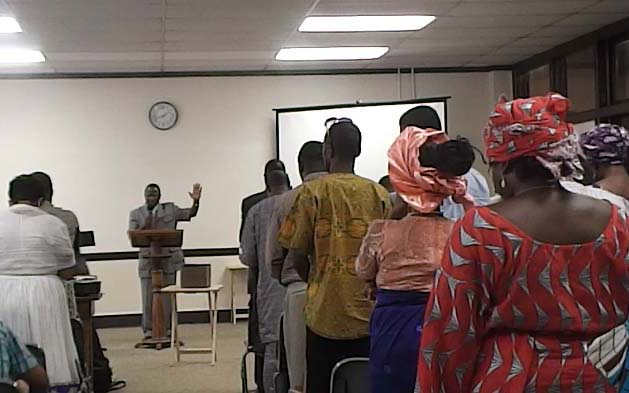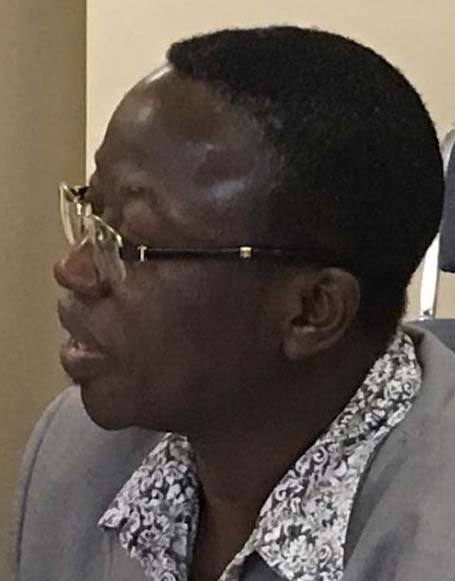
MINNEAPOLIS (BP) — When Philip Nache was growing up in Nigeria, the young Christian had plenty of friends among the majority Muslim population in his hometown.
 “Boko Haram wasn’t there yet,” he said of the militant Islamist group that has ravaged the central African country in recent years. “Most of my friends were Muslims. They would come to our house to sleep. We had that family relationship.”
“Boko Haram wasn’t there yet,” he said of the militant Islamist group that has ravaged the central African country in recent years. “Most of my friends were Muslims. They would come to our house to sleep. We had that family relationship.”
Nache would visit the mosque and his friends would visit the church. He tried to learn some Arabic when they would teach him.
But he never gave up his faith in Christ.
“I didn’t know that, through those experiences, God was preparing me for when I grew up,” Nache said. “I love Muslims and I desire to reach out to them, and knowing about Islam has helped me to do that.”
 For 20 years in Africa, he gave witness to his faith, both personally and through a DVD he created to explain the Gospel to followers of Islam. It’s been distributed over and over in Nigeria.
For 20 years in Africa, he gave witness to his faith, both personally and through a DVD he created to explain the Gospel to followers of Islam. It’s been distributed over and over in Nigeria.
Then it fell into the hands of Boko Haram a few years back. Threats on his life soon followed.
“I have story after story of persecution,” Nache said. “But I also have story after story of how God protected me.”
He can see God’s hand on his life when he and his wife Jummai finally fled Nigeria and landed in Minneapolis. They began to meet people from South Sudan who also were fleeing violence in their country.
“They are people who are suffering a lot from war, and having seen where they came from, I deeply identify with them,” Nache said. “You hardly will find one that does not have some story of coming here because of war.”
So he began to visit with them in the markets, in their homes and in the hospital to hear their stories and minister to them. As they began to respond to the Gospel, he gathered them in his home for Bible study.
Now they are a congregation of about 50 called Hope of Nations Evangelical Church. Some of them are Christians who were persecuted for their faith, Nache said. Some are Christians who adopted Islam after being threatened, then returned to their Christian faith after they fled the country.
“Some of them had nominal Christianity and hadn’t been discipled, and when persecution came, it was hard for them to stand their ground,” Nache said. “Their faith has deepened since they have come to the U.S.”
And some are Muslims who have found hope in Jesus for the first time, he said.
“Most of them are here as refugees, and there are some who desire to go back home,” Nache said. “There are many who are on fire for the Lord, and we are training them here so that if they return, they can spread the true Gospel and start strong churches.”
Joshua Whetstine, the North American Mission Board’s missionary in Minneapolis for its Send City church planting initiative, said Hope of Nations’ members have a vision for what God can do in South Sudan, and Nache has a vision to make sure they have the tools they need.
“God is stirring in their hearts for their people, and Philip wants to make sure they are equipped in their cultural language to be ready to share in their context,” Whetstine said. “A seed is being planted in Minneapolis of a people movement.”
It’s not just happening among South Sudanese, he said. Minneapolis now has 25 church plants, a third of which are immigrant specific.
“We have a Korean church, Ukrainian, Russian, Hmong, Hispanic, Brazilian,” Whetstine said.
The city also is home to Ebenezer Community Church, one of the largest immigrant-built churches in the United States. Ebenezer, which was started by Francis Tabla in 2000, focuses on Liberian immigrants and now has about 500 members and two church plants.
Immigrant churches are “challenging, they’re not easy,” Whetstine said, “but if you enable them to lead out well, they do last.”
That’s exactly what Nache said he is hoping to do.
“It’s a calling for me, wanting to reach out to people in difficult circumstances,” he said. “All of them have stories, and I pray that those stories will lead them to Jesus.”













